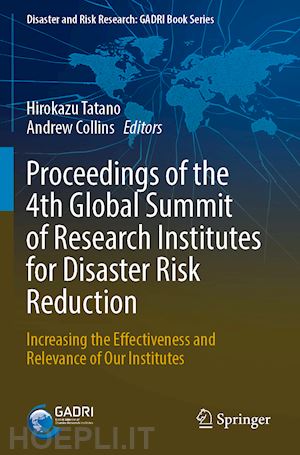
Questo prodotto usufruisce delle SPEDIZIONI GRATIS
selezionando l'opzione Corriere Veloce in fase di ordine.
Pagabile anche con Carta della cultura giovani e del merito, 18App Bonus Cultura e Carta del Docente
Report on the 4th Global Summit of Research Institutes for Disaster Risk Reduction (4thGSRIDRR2019).- Enhancing disaster preparedness and building resilience: UNESCO's multi-hazard, multi-disciplinary, and multi-stakeholder approach on Disaster Risk Reduction.- Presentation on “The Sendai Framework and Science Advice to Governments to Support Implementation – Suggestion on What Works”.- Presenting the “Global Risk Assessment Framework (GRAF), UNISDR – Emphasising the Relevance of Disaster Research Institutes”.- DRMKC: A collaborative approach to foster resilience.- INFRASTRUCTURE RESILIENCE: A FRAMEWORK FOR ASSESSMENT, MANAGEMENT AND GOVERNANCE.- Harnessing Scientific Knowledge and Technological Innovation for Disaster Risk Reduction (DRR) in Sub-Saharan Africa-Case of Social Media.- Concept Notes for Group Discussion Sessions.- Community resilience against flood: the case of the LIFE PRIMES project.- Yonmenkaigi System Method as an Educational Framework for Climate Change within the United Kingdom: A Pilot Study.- Personalizing a Low cost weather forecasting system.- Transforming Flood Risk Management: A Case of Kakching, Manipur, India.- Adaptive Architecture- A Pathway to Resilient Communities.- RETURN PERIOD ANALYSIS OF MAJOR FLOOD EVENTS CONSIDERING HOMOGENEOUS REGIONS.- Conceptual Design for Flood Warning Study at Recreational Area – Case study Gunung Pulai Mountain, Johor, Malaysia.- IMPACT OF VIBRATION AND MOISTURE CONTENT TO LIGHT NON-AQUEOUS PHASE LIQUID MIGRATION IN DOUBLE POROSITY MEDIA.- Resolution of the 4th Global Summit of Research Institutes for Disaster Risk Reduction: Increasing the Effectiveness and Relevance of our Institutes Held at the Disaster Prevention Research Institute (DPRI), Kyoto University, Kyoto, Japan from 13th to 15th March 2019.- Closing Ceremony.











Il sito utilizza cookie ed altri strumenti di tracciamento che raccolgono informazioni dal dispositivo dell’utente. Oltre ai cookie tecnici ed analitici aggregati, strettamente necessari per il funzionamento di questo sito web, previo consenso dell’utente possono essere installati cookie di profilazione e marketing e cookie dei social media. Cliccando su “Accetto tutti i cookie” saranno attivate tutte le categorie di cookie. Per accettare solo deterninate categorie di cookie, cliccare invece su “Impostazioni cookie”. Chiudendo il banner o continuando a navigare saranno installati solo cookie tecnici. Per maggiori dettagli, consultare la Cookie Policy.